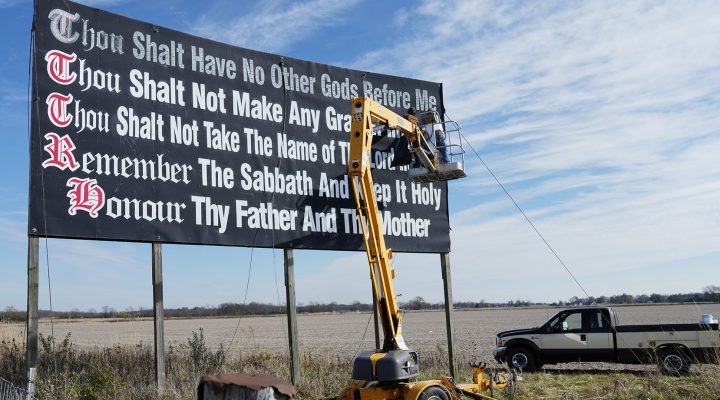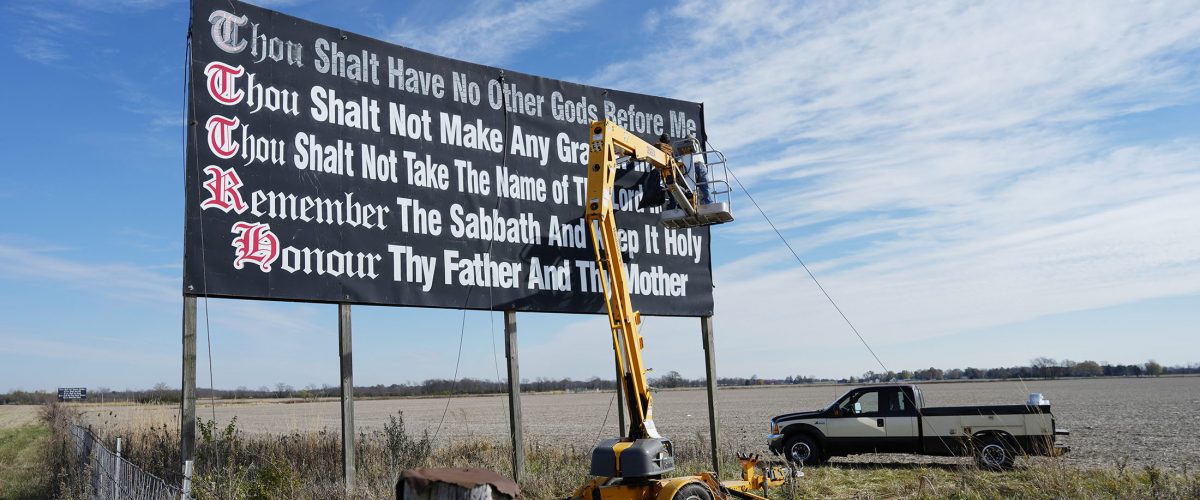Scores of Louisiana churchgoers and pastors, including dozens of Baptists, are pleading with Gov. Jeff Landry to veto a bill requiring the display of the Ten Commandments in all state-funded classrooms.
“We do not need to turn public schools into Sunday schools. Veto HB 71 and leave biblical instruction and religious education where it belongs — with our families, churches and religious institutions,” reads a petition signed by 115 clergy and lay members representing Baptist, Catholic, Episcopal, Methodist and other denominations.
Legislators approved the measure May 28 and it was sent to the governor’s office June 4. If signed, Louisiana would become the first state with Ten Commandments displays in public-school, college and university classrooms.
The legislation requires the commandments be displayed either as posters or framed documents, be easily readable and no smaller than 11-by-14 inches. Each display must include a statement extolling the role of the commandments in U.S. history and may be accompanied by “other historical documents” including the Mayflower Compact and the Declaration of Independence.
“Recognizing the historical role of the Ten Commandments accords with our nation’s history and faithfully reflects the understanding of the founders of our nation with respect to the necessity of civic morality to a functional self-government,” the bill reads.

Shane McNary
But displaying the commandments essentially strips them of spiritual value, said Shane McNary, coordinator of ministry for Great Rivers Fellowship, the Cooperative Baptist Fellowship region covering Arkansas, Louisiana and Mississippi.
“As faith leaders and as people of faith, it does not sit well with us to take Scripture and reduce it to the level of a mere historical document,” said McNary, who helped organize the petition drive.
McNary urged lawmakers to turn their attention to providing adequate funding for public schools and to leave religious education to those called and equipped to provide it: “The responsibility of teaching matters of faith should be left to parents and churches to teach, not shifted over to have big government teach religion to children.”
The petition delivered to Landry also takes issue with the translation mandated by the legislation. The commandments, some of them abbreviated, are presented in modern English mixed with King James formality, including “Thou shalt not make to thyself any graven images” and “Thou shalt not take the Name of the Lord thy God in vain.”
“It is simply not possible to create a version of the Ten Commandments that honors every faith tradition’s interpretation.”
The petition describes the translation as “a hodgepodge of holy Scriptures” that offends the sensibilities of many Christians. “Nor does this state-dictated language honor or reflect the beliefs of our Jewish brothers and sisters. Indeed, the state-approved version of the Ten Commandments set forth in HB 71 does not exist in any translation of the Bible. It is simply not possible to create a version of the Ten Commandments that honors every faith tradition’s interpretation, and legislators’ attempt to do so is deeply offensive to us as Christians.”
The bill is an example of the problems created when government mixes with religion, the document adds. “The state certainly has no business mandating that this officially sanctioned version of the Ten Commandments be hung in every public-school classroom, where teachers educate students who follow a broad array of Christian and non-Christian faith traditions.”

Marc Boswell
Marc Boswell, senior pastor at St. Charles Avenue Baptist Church in New Orleans, said he signed the petition because the Louisiana law violates the religious liberty of students, families and educators.
“I believe it is the responsibility of families and religious congregations to provide religious instruction to our children. It is not the duty of our public-school teachers or administrators,” he said. “My congregation and I stand firmly in our Baptist heritage and believe in the separation of church and state, and this bill represents a clear, unconstitutional violation of the intention of our founding fathers to provide for this separation of interests. It is better for both the state and the church to keep religious establishment out of our public institutions.”
The legislation claims the mandate is appropriate and protected under the U.S. Supreme Court’s 2005 ruling in Van Ogden v. Perry, which held that a Ten Commandments monument at the state Capitol in Austin, Texas, did not violate the Establishment Clause because it was one of several monuments on the grounds, did not have a purely religious intent and was donated to the state.
But in a joint statement issued May 28, the American Civil Liberties Union, Americans United for the Separation of Church and State and the Freedom from Religion Foundation said the Louisiana bill is anything but constitutional: “The state may not require public schools to display the Ten Commandments in classrooms. Many faith-based and civil rights organizations oppose this measure because it violates students’ and families’ fundamental right to religious freedom.”

Holly Hollman
The organizations said they are closely monitoring the situation and urged Landry to veto the legislation. “Politicians should not be forcing religious Scripture on students. Our public schools are not Sunday schools, and students of all faiths — or no faith — should feel welcome in them.”
Holly Hollman, general counsel for Baptist Joint Committee for Religious Liberty, also wrote a letter to Landry.
What the bill actually mandates is a government intervention in the religious lives of individuals and families, she said. “Nobody should be told by the government how to worship, what Scripture to read, or when to pray. Government-mandated displays of the Ten Commandments disrespect religious diversity and foster conflict in our public schools. This legislation wrongly suggests that the government holds religious authority over school children.”
Related articles:
If you want to post the Ten Commandments in schools, you ought to learn more about them | Analysis by Rick Pidcock
Ten Commandments bill dies in Texas Legislature
Texas Ten Commandments bill is a bad idea, Tyler and Hollman warn


